Every corporation requires a set of rules that will guide and align them with the state’s policies. Therefore, corporate bylaws are necessary for the smooth running of the corporation. Consequently, for any corporation to thrive, there needs to be a proper corporate bylaw that details the essentials of the business within the scope of a state.
This article will review corporate bylaws in their entirety, so you get to see the meaning and importance of them. Plus, we will show you the best template and how to write solid corporate bylaws.
For your company’s success, these bylaws dictate how your company should be run. It is excellent to have these as the regulations help you conduct your company’s affairs properly.
Corporate bylaws are written rules that detail the duties and responsibilities of the officers in the corporation, policies, and other intricacies that ensure the corporation or company’s smooth run. The written rules guide your company’s internal management and affairs.
Furthermore, it ensures that everyone in the company has a clear understanding of what the company stands for, the responsibilities of every member, appointment of the board of directors, information on stock and shares, and other important information that we will look at in this article. Also, the corporate bylaws will help define the shareholder ownership rights, the process of selecting and removing officers as well.
These bylaws also detail the daily operations of the officers, and everyone involved in the corporation. With a proper document outlining the daily practices, there will be continuity and clearly stated values that will ensure the corporation thrives. Plus, the bylaws are subjected to reviews and amendments after every few years.
You do not need to be confused when you see company bylaws and business bylaws, as they both are the same as corporate bylaws.
Corporate Bylaws Templates
With all these intricacies involved in creating corporate bylaws tailored to your company and niche, it can be challenging to find the best template that suits you. However, we will alleviate the stress that you may encounter. We have multiple templates for your company to avoid future issues.
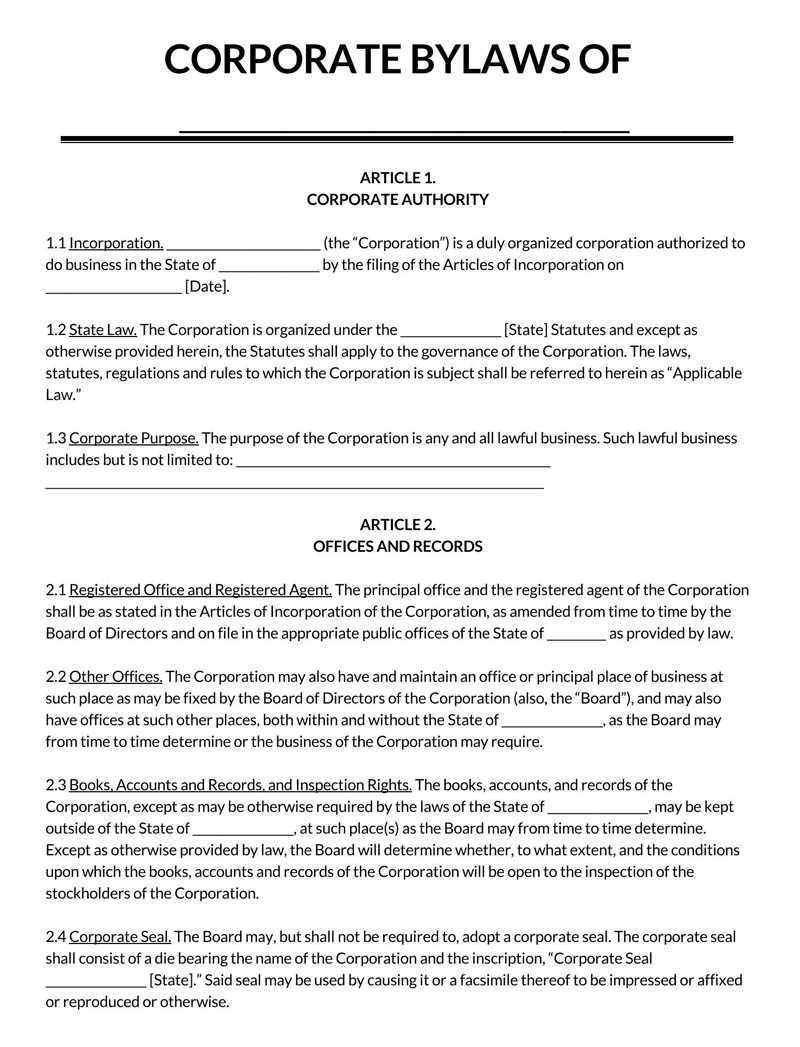
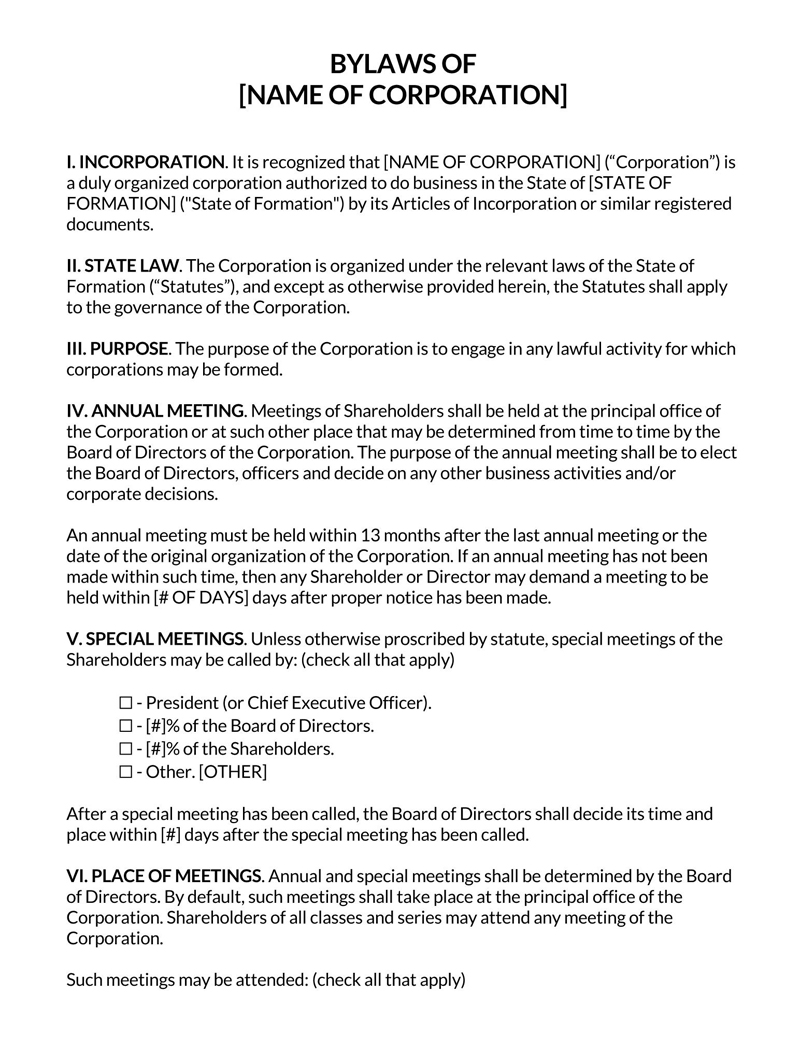
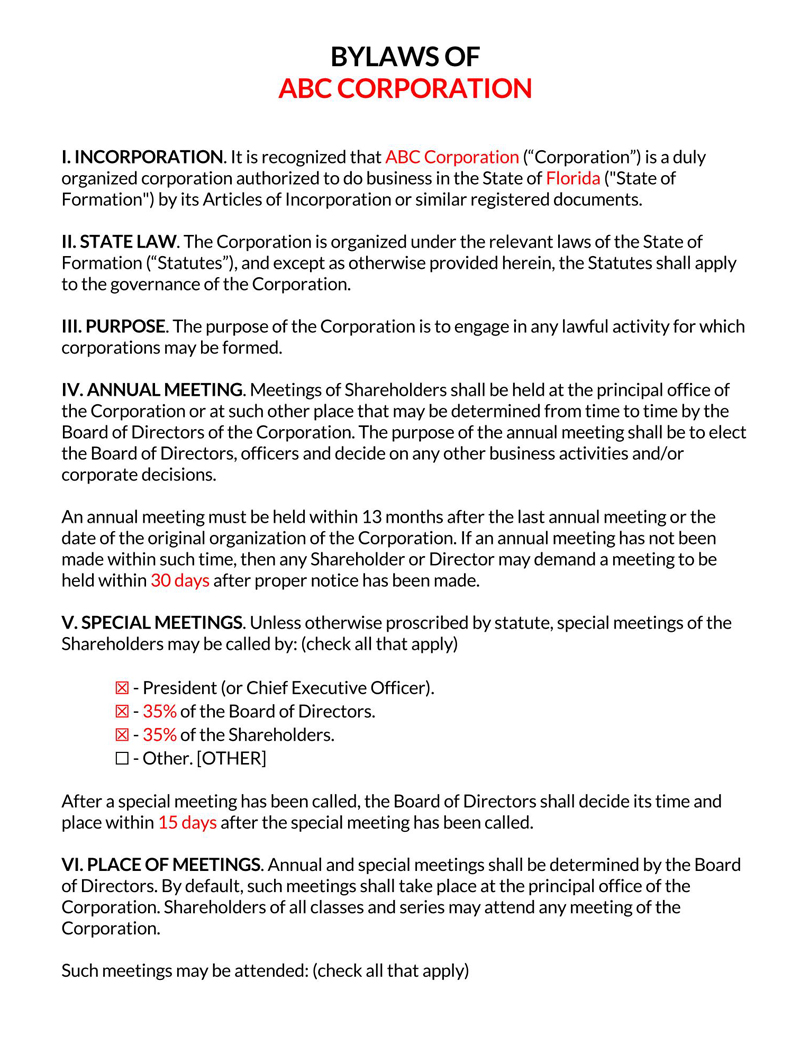
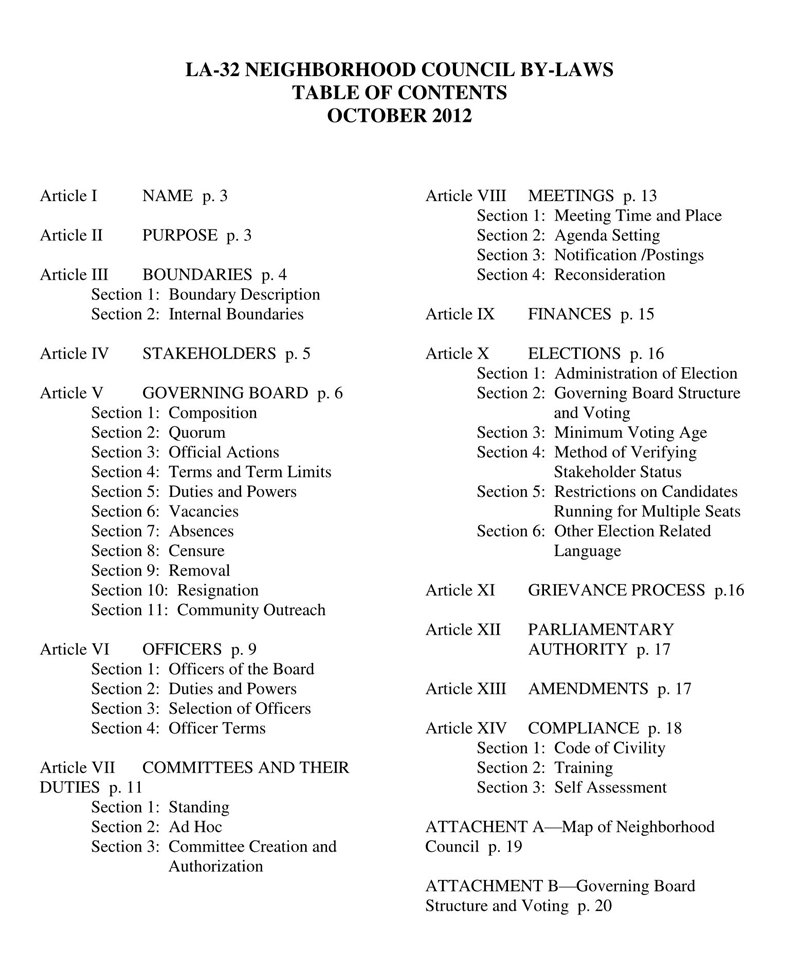
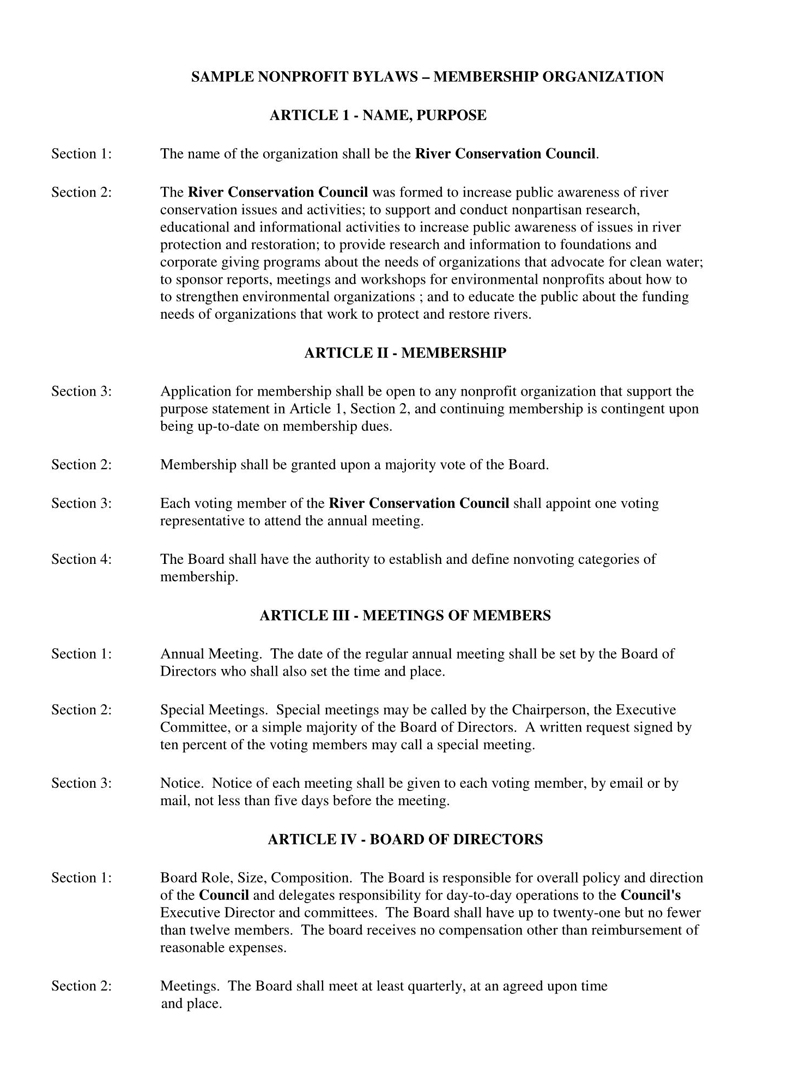
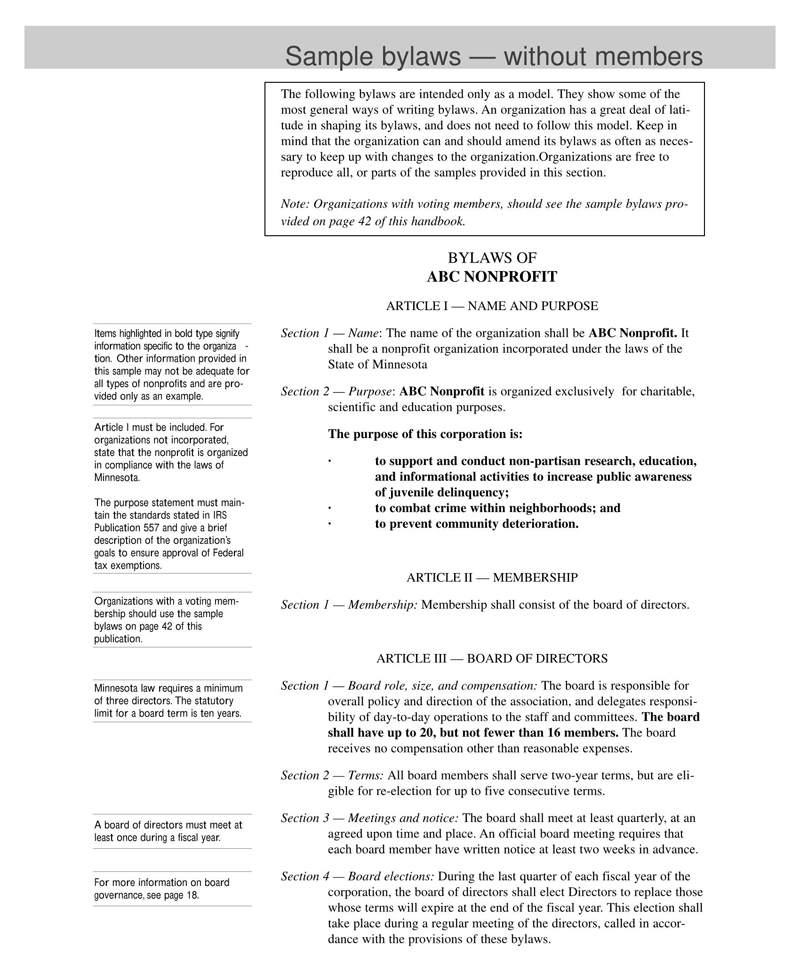
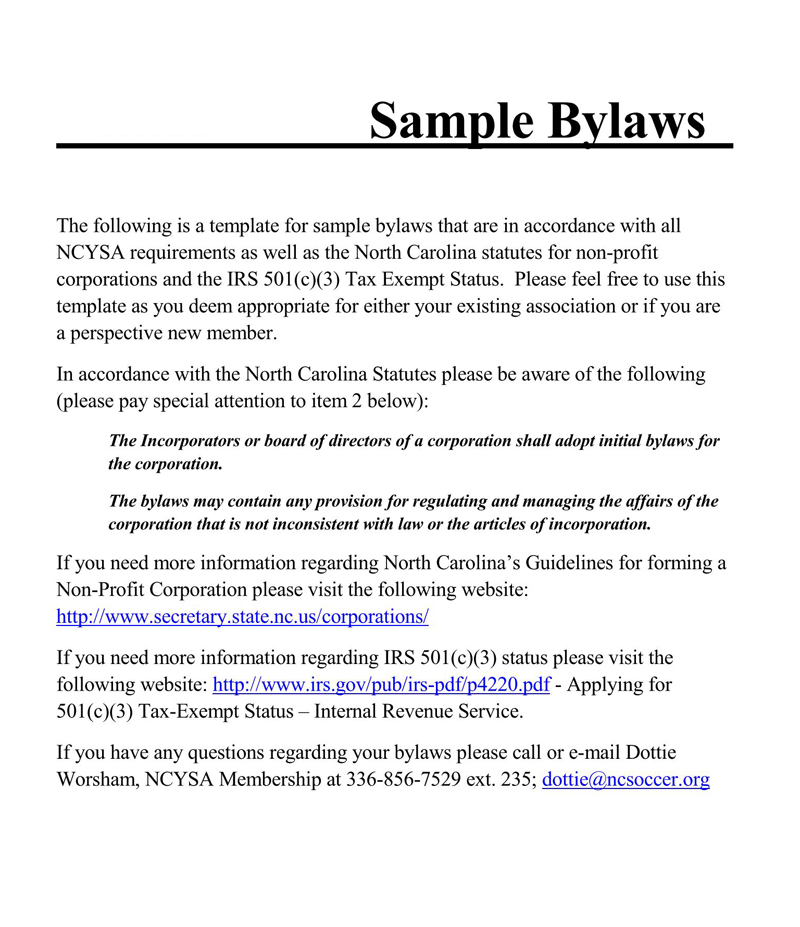
By State
Who Needs it?
Corporations require corporate bylaws for the smooth running of the business and for a clear understanding of what the business stands for and how it will work to achieve its goals. Therefore, rules for various meetings, responsibilities of shareholders and directors, and voting rights are appropriately documented in bylaws.
When to Use it?
It is best to use a corporate bylaws template when you are thinking of turning your company into a corporation. Some states require you to have these bylaws, however, the corporate bylaws correctly detail specific information like the number of board of directors and the amendment structure of the bylaws. Furthermore, financial institutions, investors, and legal authorities might want to look at your company affairs, and a corporate bylaw will suffice at that point.
C corporations
C Corporations must present their corporate bylaws, plus the IRS that rates the C Corps as a standard for corporations. Therefore, if your company is incorporated as a C Corp, you will be taxed separately from the shareholder. However, you will retain profits and losses.
S corporations
In order to protect shareholders, the bylaws for S Corporations follow state guidelines and are more or less the same as the mandates that guide the C Corporations.
Limited liability company (LLC)
If you have ever seen or heard about LLC operating agreements, you would realize that it is more or less the same as bylaws. The operating agreement outlines the responsibilities of shareholders and all company members. Furthermore, the LLC operating agreement guides the company in managing its affairs. So, in retrospect, LLCs do not need it, but the operating agreement is a legal document that protects the business owners.
Corporate bylaws vs. Articles of Incorporation
Corporate bylaws are a written set of rules that guide daily operations. Plus, it is a set of guidelines that instruct shareholders, members, and board of directors on their responsibilities and how the business should be run right down to the last letter. Corporate bylaws do not need to be filed by the state. However, in some states, it is required to detail the number of board of directors.
On the other hand, the articles of incorporation are filed by the state and detail how a business can be registered as a corporation. In addition, these papers outline the structure of the company, the members of the company, the board of directors, and the location of the corporation.
How to Write Corporate Bylaws
These bylaws are necessary but writing them is even more critical. This is because every type of organization will have specific details that may make the bylaws slightly different from another. However, some specifics need to be included in a company bylaw.
First of all, you need to include the structure and the corporation’s basic information. This includes the company name, the address of that company, and the headquarters if there are offices in different areas.
Consequently, the list of committees and how the board of directors has been appointed need to be outlined in the template.
Furthermore, the responsibilities of all officers in the corporation need to be correctly spelled out. Therefore a corporate bylaws template should outline these roles. The shareholder’s information, the way the meetings should be conducted, and stock options of the corporation should also be included in the company bylaws template.
The process through which the corporate bylaws can be amended, and the company records also need to be included. If it is necessary, you can add the articles of incorporation.
Essential Terms to Know
You need to know the essence of some particular terminologies to fully understand the extent to which the company bylaws can be applied. Therefore, we will look at some terms you need to know when filling the company bylaws template for your business.
- Special meeting: In a situation where a decision has to be taken quickly, a special meeting is called by shareholders or directors. However, special meetings depend on the type of decision to be made in order to know the people who will be present at that moment.
- Quorum: This is the least number of members that must be present to make a decision. The set number might be based on the number of shares to effectively conduct business.
- Remote communication: This is communication held outside the premises of the company. With the current pandemic, many meetings have been held remotely with the use of different video conferencing applications.
- Voting trusts: This is when shareholders combine their voting power by transferring their shares to a trustee based on an agreement.
- Cumulative voting: This is when the voting system is based on the number of shares a shareholder has but then multiplied by the number of directors they can vote for. This voting system helps minority shareholders influence decisions as a group and make credible changes.
Decisions to be Considered
Some decisions need to be considered in the bylaws template as highlighted below to help you better prepare yourself.
- Notice for special meetings: This notice is the amount of time you give for a special meeting. However, sometimes, there may be no notice based on the urgency of the decision to be taken.
- Remote meetings: This answers whether it is appropriate to use remote conversations for meetings with shareholders and directors or not.
- Voting: The issues of whether cumulative voting is allowed or the percentage of voting that will ensure a quorum and if you can form voting trusts as a part of the decision needs to be considered.
- Company management structure: You need to know what type of company structure you will be operating, whether a simple structure comprises a president, secretary, or officer. It could also be a complex company structure with a CEO, CFO, presidents, vice presidents, and other officers. Corporate bylaws for your business should outline how many directors you can have, plus the eligibility criteria for officers. Furthermore, in the bylaws, you can decide if your corporation will be lending money to officers.
Information to be Included
In preparing a simple template, the mandatory information for your company affairs is adequately outlined without any ambiguity.
Although each company will have a different set of guidelines, generally, corporate bylaws for your business should have the following:
Basic information
Bylaws of a corporation should include the full name of the company and why it was formed. In addition, you need to explain the goals and why your company came into existence. Plus, the complete address of the place of business should be included.
Members
Who are the members, and what are their roles? First, you need to detail the types of members you have and the selection process for these officers. Furthermore, the process through which they will be disciplined, removed, and promoted.
Board of directors
The selection processes of the directors, their responsibilities, the number, and how the vacancies can be filled should all be documented in the corporate bylaws. The board of directors writes the bylaws and also outlines the appointment criteria for members. The board of directors together will examine how much power each member has, the tenure for each position, the details of meetings, and the resignation process of members.
Furthermore, the board ensures that committees comprise of its members so that responsibilities can be properly shared as the duties of the committees are also outlined in the corporate bylaws.
Committees
If there are any special committees, you need to detail how they function and their appointment process in your company bylaws.
Officers
The bylaws template needs to specify the type of officers you require in the company, plus the appointment process, duties, length of each officer’s tenure, processes of early resignation, and promotion requirements.
Meetings
The corporate bylaws need to specify the time for regular and annual meetings. Plus, you need to specify how many members will make up a quorum. Furthermore, the process through which attendees will be notified will be detailed in the template.
Stock
You need to specify the number of stock certificates that your company will issue plus the stock classes offered. It is also essential to know whether a transfer agent will be used.
Money lending
Can you lend money to the officers, directors, and board of directors? Again, your corporate bylaws will dictate this, so there will be no issues.
Conflicts of interest
Companies suffer severe IRS penalties when they don’t provide provisions for conflict of interest. Therefore, your company’s bylaws template needs to influence provisions for conflicts of interest.
Amending bylaws
What are the rules for amending the bylaws? Let a written set of guidelines explain how your company can amend the bylaws. As the company expands, so will the operations change. Therefore, the corporate bylaws are subject to amendment based on the expansion rate of the company. However, the amendment process differs among corporations with some companies needing a majority vote by the board of directors and shareholders.
Frequently Asked Questions
Not all states require a corporation to create bylaws, but to be on the safe side, you need a lawyer to check the state requirements.
No, they are not the same thing. The state files the Corporation’s Articles, and the company bylaws are not. Also, the articles of incorporation show how a company can be registered as a corporation, while the corporate bylaws detail how a company’s internal affairs should be run.
The directors of the creation will first adopt the bylaws at the first general meeting, which will guide how the company will be run. Although, as time goes on, there may be a need to change it; hence the directors resolution can be used to change the corporate bylaws sample.
Yes, they can be amended by the director or shareholder resolution. The different policies by the state or nation can affect the way a company is run. Therefore directors can implement changes that will be reflected in the company bylaws.




